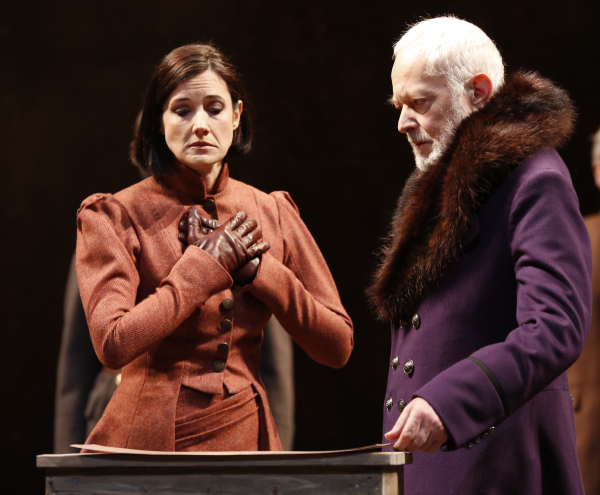
(© Carol Rosegg)
If you have children, you might eye them with greater suspicion after a viewing of William Shakespeare's King Lear at Theatre for a New Audience's Polonsky Shakespeare Center. The serviceable production dots the i's and crosses the t's in this tragedy of aging without wisdom. If you like your Shakespeare without a lot of auteurship, this is the production for you.
Lear (Michael Pennington) is the aging king of Britain. He decides to retire from governing, but not before dividing his kingdom among his three daughters based on their protestations of love for him. While his older daughters, Goneril (Rachel Pickup) and Regan (Bianca Amato), submit to this charade with purple prose and exaggerated supplication, his youngest, Cordelia (Lilly Englert), is having none of it. In response, Lear disinherits her. Of course, he quickly discovers that he shouldn't have put his faith in mere words: Goneril and Regan collude to deprive their father of his remaining power. Meanwhile, Edmund (Chandler Williams), the bastard son of the Earl of Gloucester (Christopher McCann), plots to turn the jealous sisters against each other and seize power for himself, defying his lowly birth and, in the process, throwing his father and "legitimate" brother, Edgar (Jacob Fishel) under the bus. In true Shakespearean fashion, lots of sex and violence ensues.
TFANA's Lear is the second of three major productions in New York City this year. The first appeared at BAM, just two blocks away in Brooklyn. The third, starring John Lithgow, is set for Shakespeare in the Park this summer. Is this glut of Lears indicative of a generational anxiety, as a record number of baby boomers reach the age of retirement?
Resisting the urge to tie the story to American generational politics, director Arin Arbus (TFANA's Much Ado About Nothing) has staged a solid production that allows the words and themes of this timeless play to speak for themselves. The scenes are clear, the lines are crisp, and the violence (with stage combat by B.H. Barry) is believable. Unfortunately, it is not always in service of the text: The final fight between Edgar and Edmund, which includes a lot of twirls and clanking steel, looks a little too showy for a fight to the death between two brothers. This moment should be Cain and Abel, not The Scarlett Pimpernel.
While the male characters have medieval broadswords strapped around their waists, Susan Hilferty's period costumes look straight off of an episode of Downton Abbey in which the whole cast is engaged in some hardcore equestrianism. Well-tailored coats of heavy dyed wool hang over knee-high boots. Belts, bootstraps, and berets abound, subtly hinting at World War I without resorting to Brodie helmets. This visual feast is occasionally ridiculous, like when Goneril tries to sexily unbutton her severe yellow riding frock. It makes her look all the more pathetic in a vain attempt to seduce Edmund.
Riccardo Hernandez's set is less specific, easily allowing for the rapid-fire scene changes that are so necessary in Shakespeare. A huge metal slab precariously hangs from the upstage wall, threatening to crush everyone onstage. Muscular sound design (Michaël Attias and Nicholas Pope) and schizophrenic lighting (Marcus Doshi) thrillingly track Lear's visceral descent into madness. The sound, in particular, brings us into Gloucester's head, allowing us to experience a bloody battle from the perspective of a blind man.
McCann gives a sympathetic performance as Gloucester, a man befuddled by the changing world around him. His chemistry with Lear is remarkable, suggesting a lifetime of friendship. Fishel's Edgar is every bit the good son, exhibiting a gentleness with his father and a growing assertiveness with his brother. We watch him grow up over the course of the play.
Meanwhile, we see Lear grow old and powerless. Pennington's Lear betrays flashes of awareness of his fatal error. He quickly banishes these momentary realizations, as he would an unruly vassal, until he can no longer ignore the truth: His thoughts are the only things truly under his control, and increasingly that is not even true. His plea to heaven, "Let me not be mad," takes on a new urgency as he slips into dementia.
There is something comforting in the tranquility Pennington's Lear finds near the play's end. It's a happy detachment approaching nirvana. This makes the play all the more tragic when he's shaken out of that peace by the abrupt death of Cordelia, the good daughter he scorned. His animalistic wail will echo through the chambers of your mind long after you've left the theater, even if much of the rest of the production doesn't have the same lasting power.









